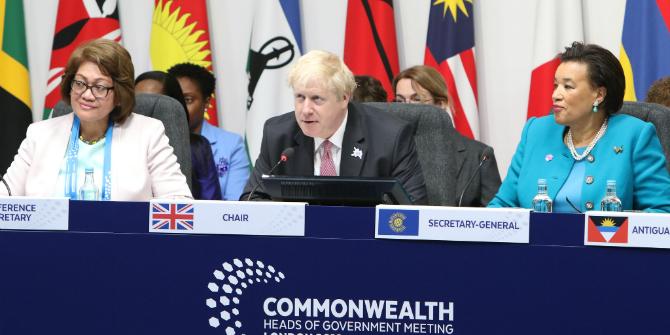 It’s time for the Labour Party to have a sensible discussion about immigration within the EU. The traditional perspective of the British socialist Left on immigration is neither the liberal viewpoint that immigration is inherently good nor the xenophobic viewpoint that it is inherently bad. Instead, practically minded British socialists have argued that immigration must be evaluated on the basis of how it affects working people in this country. For the British Labour Party founded to protect and promote the interests of the British working class, this concern must be central in how it evaluates its economic policies, argues Richard Johnson.
It’s time for the Labour Party to have a sensible discussion about immigration within the EU. The traditional perspective of the British socialist Left on immigration is neither the liberal viewpoint that immigration is inherently good nor the xenophobic viewpoint that it is inherently bad. Instead, practically minded British socialists have argued that immigration must be evaluated on the basis of how it affects working people in this country. For the British Labour Party founded to protect and promote the interests of the British working class, this concern must be central in how it evaluates its economic policies, argues Richard Johnson.
In the context of the EU referendum, I argue that there is a strong case to be made from the Labour Party’s perspective against EU free movement and, therefore, EU membership. In particular, the policy of unregulated economic migration within the EU should be rejected because of its disproportionately negative impact on low-skilled British workers and on non-EU British immigrant communities.
Certain forms of immigration can make a very valuable contribution to a national economy. It can be good for economic growth and can attract dynamic, hard-working, innovative people into the labour force. However, immigration can also depress wages, place pressure on services, and engender community tension. It is very lazy and wrong to pretend otherwise — on one side or the other.
The right for any citizen in an EEC/EU country to live and work in another EEC/EU country has existed since the 1960s when the EEC consisted of seven rich, western European countries. Today, the policy continues but across twenty-eight countries with over half a billion people. The expanded EU, I argue, has changed the economic implications of EU free movement, especially for low-skilled workers in rich countries (e.g., the British working classes).
Since 2004, the EU has added thirteen countries in eastern and southern Europe, which has generated uneven labour flows across the EU. While there are compelling reasons from the perspective of poorly paid (or unemployed) workers in eastern and southern Europe to relocate to higher wage economies in the west and north of Europe, there is little incentive for British workers to go to the post-2004 EU countries where the quality of life is lower and minimum wage is as low as £1.36 per hour, if it exists at all.
For example, while more than half a million Poles have moved to Britain, only 764 British citizens have relocated to Poland. Two-thirds of all Polish citizens living in the EU outside of Poland live in Britain or Germany.[1] From the vantage point of an individual Polish worker, this movement is perfectly logical, and it would be unfair to castigate people for following the economic logic of existing rules. However, from the vantage point of the British labourer, east-west free movement in the EU is one-directional, and many people in Britain resent the policy.
Objection to unregulated economic migration within the EU is not simply due to its unevenness. The more pressing issue is the effect of large flows of low-wage, low-skilled workers on the economic security of working people in Britain. There are two concerns. The first is the phenomenon of downgrading. New immigrants will often take jobs which require fewer skills than they are qualified to do. For example, people who have studied to be nurses or accountants end up taking jobs as cleaners or cashiers, leading to an inefficient allocation of skills and jobs. Some scholars have argued that this is an injustice of free movement which not only affects the new country of settlement but also the country of departure because it results in a ‘brain drain’ for poor countries.[2]
The second, related concern is the impact of this form of migration on the value of labour in Britain. What is the effect on the labour value of a construction job in the UK when a builder from Bulgaria comes to Britain and is accustomed to doing a job for much less than an existing British builder would expect to be paid? A study from UCL found that immigration depresses wages below the 20th percentile of the wage distribution, but leads to slight wage increases in the upper part of the wage distribution. Each 1% increase in the share of migrants in the UK-born working age population leads to a 0.6% decline in the wages of the lowest paid workers and to an increase in the wages of higher paid workers.
To his credit, when he was Labour leader, Ed Miliband was right when he said immigration is a class issue. Miliband acknowledged that free movement had differential impacts on British workers, with low-skilled workers seeing higher job competition and wage depression. Despite promises to address its impact through changes to benefit laws and stricter minimum wage enforcement in the last Labour manifesto, the party could not address the central problem: Under the EU, millions of low-skilled migrants can move to Britain and devalue labour without anyone in this country being able to stop them.
The London Underground
Free movement for economic migrants can’t work fairly in an EU with vastly unequal standards and heterogeneous national economies. To make EU free movement work fairly, substantially increased EU integration would be required. The EU would need a coordinated wage policy, which cannot be achieved without a fiscal or monetary union – none of which are palatable to the British public and would only serve to exacerbate British Euroscepticism. Massive redistribution and economic development across the EU would also be necessary to bring the living standards of poor EU nations on par with rich, economically successful EU countries.
People sometimes say Labour should support EU free movement because Labour is ‘an internationalist party’. I would argue, however, that EU migration policy is narrow and discriminatory. It is not internationalist to prioritise (white) Europeans at the expense of people around the world who have much stronger historic and cultural ties to this country. By joining the EEC, Britain abandoned our partners in the (much more diverse) Commonwealth — hundreds of thousands of whose citizens of all faiths and races died fighting for Britain in recent wars. Australia’s Labor Prime Minister Paul Keating lamented to the Australian people that Britain ‘walked out on you’ when it joined the EEC.[3]
EU membership has led to an extremely inefficient immigration system, with no ability to prevent surpluses of labour in various sectors of the economy. Because of the complete lack of regulation in the internal EU labour market, the only way Britain can attempt to limit surpluses of labour is by restricting non-EU migration severely. As a result, skilled non-EU migrants are being blocked from entry into this country. Entrepreneurs from Botswana, academics from South Africa, and graduates from India are being turned away.
In fact, Britain’s existing immigrant populations have reason to be resentful of EU migration. The negative impact of wage depression from recent EU migration has been disproportionately shouldered by immigrant communities already in Britain. The Labour MP Khalid Mahmood, who is working to persuade British ethnic minority communities to vote to leave the EU, explained the situation well: ‘[By leaving the EU] we can get people in from the Commonwealth countries based on the contributions they can make, such as the qualifications they have and what they can do, without having the people coming in from Eastern Europe who are undercutting our workers…’ Mahmood’s point is that an immigration policy should be predicated on our national economy’s needs. We currently do not have an immigration policy which treats people around the world fairly or allows us to regulate immigration which is in the best interests of the British state.
The policy of free movement of people across an expanded EU of vastly unequally living standards has, in the past decade, caused great resentment in many parts of Britain. The British working class and existing immigrant communities have been disproportionately negatively impacted by EU free movement, especially in the past decade of rapid EU expansion. It is a scandal that most Labour politicians fail to acknowledge this fact and, in some cases, champion the very policy which has harmed Labour’s traditional supporters.
Note: This article gives the views of the author, and not the position of BrexitVote, nor of the London School of Economics.
Richard Johnson is a DPhil candidate in Politics at Nuffield College, University of Oxford. He researches elections and representation in the USA and Britain. He has co-authored (with Ashley Walsh) a book on labour history: Camaraderie: One Hundred Years of the Cambridge Labour Party, 1912-2012.
[1] M Benton & M Petrovic, How Free is Free Movement? Dynamics and drivers of mobility within the European Union, Brussels: Migration Policy Institute.
[2] Paul Collier, Exodus: Immigration and Multiculturalism in the Twenty-First Century, Oxford: Oxford University Press, 2013.
[3] Paul Keating, Speech to the House of Representatives, 24 February 1992.







